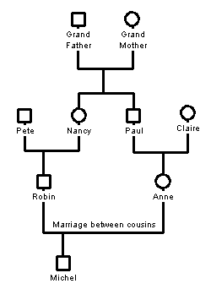Kashmiri community is known for its moral value and rich culture ÔÇô and this is something we as a community hold close to our identity. ┬áBut as the world has already embraced the future by making Artificial Intelligence a reality, people in countries like Japan have already started to live and share their lives with Robots. But, we as a community still continue to attach social stigma to even marrying in a different caste, different family background. To set the narrative right, for now, letÔÇÖs forget a war of morality between love marriage and arranged marriage that we as a society are fighting for and against. In this blog, letÔÇÖs dive deep and introspect why we as a community still are bound in the shackles of marrying our children to a same clan, family and blood line!
Why was marrying a cousin a feasible option?
Marriage is a pious relation, which does not only include the perpetual union of a husband and a wife, but also sets the inception of fragile social transactions between their families too! And when a family decides to marry off their daughter, they are concerned about following things:
- How the in-laws of their daughter will treat her after marriage?
- Does the family of her potential in-laws come from a morally good and financially sound background?
- What is going to be the expectations of dowry?
- Will their daughter become a fortnight moon after marriage?

To avoid all these potential nagging outcomes of out-of-clan arranged marriages, in past people resorted to easy options ÔÇô ÔÇ£LetÔÇÖs marry-off our kids within clanÔÇØ. The tradition which is popularly known as ÔÇ£PaanyaarÔÇØ in Kashmiri dialect. But little did people back-then knew that the cost of avoiding potential cons of marrying their kids outside their clan will be paid by the next generation!
With advancement in science and technology, it is an established fact now that cousin marriages increase the risk of producing babies with genetic disorders! LetÔÇÖs find out why and how does this occur?
The impact of double recessive gene:
 Every normal human being has a 23 pair of chromosomes. In a total of 46 chromosomes, a child receives half of its set from his or her father and half of the set from his or her mother. But, a very important point that we need to know here is ÔÇô that every pair of chromosome contains a dominant and a recessive gene or trait. In case of mono-zygotic(identical) twins, the siblings share 100% of their genes. In a parent-child case, child shares half of its genes with his or her parent. So does the siblings. Now, if we talk about cousins ÔÇô (specifically first cousins), they share almost 8 of their genes.
Every normal human being has a 23 pair of chromosomes. In a total of 46 chromosomes, a child receives half of its set from his or her father and half of the set from his or her mother. But, a very important point that we need to know here is ÔÇô that every pair of chromosome contains a dominant and a recessive gene or trait. In case of mono-zygotic(identical) twins, the siblings share 100% of their genes. In a parent-child case, child shares half of its genes with his or her parent. So does the siblings. Now, if we talk about cousins ÔÇô (specifically first cousins), they share almost 8 of their genes.
So, in a pair of 23 chromosomes, marriage between cousins leads a situation where their child will get similar pair of 8 genes from his or her parents. Now, being the same gene, there is a higher chance that the child will receive both recessive genes from their parents. Thus, as compared to out-of-the-clan marriage, children born out of cousin marriages are at risk of having an autosomal recessive condition. This kind of condition is caused by having a ÔÇ£double doseÔÇØ of a faulty gene.
LetÔÇÖs make it a bit easy to understand:
We have two copies of every gene. In a set of gene, one is inherited from our father, and one from our mother. But out of these two genes, only one is a working copy and other one is faulty.But in some cases, if the child gets the copies of faulty genes from both of his or her parents, the child then suffers from an autosomal recessive disease. Some of the most common examples of such diseases include cystic fibrosis, thalassemia and spinal muscular atrophy.
How does cousin-marriages lead to autosomal recessive diseases?

Genetic disorders are a matter of misfortune, most of the times without giving any proper reason to explain How and Why of it. They always leave doctors and family of the patient perplexed. But finding out a child born out of cousin-marriage suffering from any genetic disorder needs no think-tanks to explain the reason!
ThereÔÇÖs no denying that most of us do have handful of faulty genes, but with a high number of intra-clan marriages over the generations increases the chances of people having similar pairs of faulty genes. (As explained above, how there are similar chromosomes found in family members). Thus, in such cases the chance of babies to be born with genetic disorders is way higher and more obvious than in the otherwise scenarios.
What is the way forward?
Go back to your roots, and find out if there has been any history of intra-clan marriages. If yes, itÔÇÖs time to end the cycle. The state government can use census reports to help finding the same. The reports collected can be shared with health departments – starting from the block-level across the Kashmir region – which can facilitate medical counseling and treatments to people who have to face the burn of cousin-marriages in the Kashmir region.

